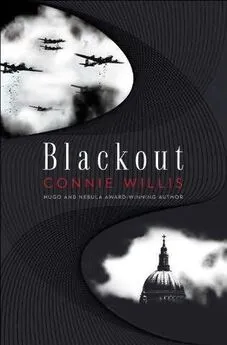Connie Willis - Blackout
- Название:Blackout
- Автор:
- Жанр:
- Издательство:неизвестно
- Год:неизвестен
- ISBN:нет данных
- Рейтинг:
- Избранное:Добавить в избранное
-
Отзывы:
-
Ваша оценка:
Connie Willis - Blackout краткое содержание
In her first novel since 2002, Nebula and Hugo award-winning author Connie Willis returns with a stunning, enormously entertaining novel of time travel, war, and the deeds—great and small—of ordinary people who shape history. In the hands of this acclaimed storyteller, the past and future collide—and the result is at once intriguing, elusive, and frightening.
Oxford in 2060 is a chaotic place. Scores of time-traveling historians are being sent into the past, to destinations including the American Civil War and the attack on the World Trade Center. Michael Davies is prepping to go to Pearl Harbor. Merope Ward is coping with a bunch of bratty 1940 evacuees and trying to talk her thesis adviser, Mr. Dunworthy, into letting her go to VE Day. Polly Churchill’s next assignment will be as a shopgirl in the middle of London’s Blitz. And seventeen-year-old Colin Templer, who has a major crush on Polly, is determined to go to the Crusades so that he can “catch up” to her in age.
But now the time-travel lab is suddenly canceling assignments for no apparent reason and switching around everyone’s schedules. And when Michael, Merope, and Polly finally get to World War II, things just get worse. For there they face air raids, blackouts, unexploded bombs, dive-bombing Stukas, rationing, shrapnel, V-1s, and two of the most incorrigible children in all of history—to say nothing of a growing feeling that not only their assignments but the war and history itself are spiraling out of control.
Blackout - читать онлайн бесплатно полную версию (весь текст целиком)
Интервал:
Закладка:
“All right, gather up your things,” she said. “Alf, fold up your map. Theodore, put your jacket on. Binnie-”
“Look!” Alf said excitedly, jumped off the platform, and ran toward the road with Binnie at his heels.
“Where are you-?” Eileen said, glancing anxiously up the tracks. “Come back here! The train-”
It was approaching rapidly. She could see it emerging from the trees. “Theodore, stay right here. Don’t move,” she ordered him and took off for the platform steps. If those two made them miss the train…
“Alf, Binnie! Stop!” she shouted, but they weren’t listening. They were running toward the Austin, which roared past them and skidded to a stop at the foot of the platform stairs.
The vicar leaped out and ran up the steps, carrying a basket. “I’m so glad I caught you,” he said breathlessly. “I was afraid you’d gone.”
“I thought you were in Hereford.”
“I was. I got stopped on the way home by a wretched troop convoy or I’d have been here earlier. I’m so sorry you had to walk all that way with the luggage.”
“It’s all right,” she said, feeling suddenly that it was.
“I thought you said drivin’ fast was only for emergencies,” Binnie said, bounding up onto the platform.
“You was going a ’undred miles an hour,” Alf said.
“Did you come to say goodbye to us?” Theodore asked.
“Yes,” he said to Eileen, “and to bring you-” He stopped and glared at the train, which was nearly at the station. “Don’t tell me the train is actually on time. It hasn’t been on time once since the war started, and now today of all days.… At any rate, I brought you some sandwiches and biscuits.” He gave her the basket. “And.… Alf, Binnie, go fetch the luggage,” and when they did, he said quietly, “I rang the Children’s Overseas Reception Board.” He handed her an envelope. “I’ve arranged passage for Alf and Binnie on a ship to Canada.”
To Canada? That’s where the City of Benares had been going when it was sunk by a U-boat. Nearly all the evacuees on board had drowned. “Which ship?” Eileen asked.
“I don’t know. Their mother’s to take them to the Evacuation Committee’s office-the address is in the letter-and they’ll take them to Portsmouth.”
The City of Benares had sailed from Portsmouth.
“And this is for you as well.” He handed her an envelope with several ten-shilling notes inside. “To cover your train fare and the children’s expenses.”
“Oh, but I can’t-”
“It’s from the Evacuation Committee.”
You’re lying, she thought. It came out of your own pocket.
“It isn’t fair to ask you to pay your own way when you’re doing the committee’s job,” he said. He glanced over at Alf and Binnie. “I’m certain you’ll earn every penny.”
“The train’s ’ere,” Alf said, and they both looked over at it.
It came to a whooshing stop.
“Thank you,” Eileen said, handing the envelope back to him, “but I don’t want you to have to-”
“Please,” he said earnestly. “I know what a worrying time this has been for you, and I thought… I mean, the committee thought that at least you shouldn’t have to worry about money. Please take it.”
She nodded, blinking back tears. “Thank you. I mean, please convey my thanks to the committee. For everything.”
“I will.” He looked at her searchingly. “Are you all right?”
No, she thought. I’m a hundred and twenty years away from home, my drop’s broken, and I have no idea what I’m going to do if I can’t find Polly.
“Whatever it is, you can tell me,” the vicar said. “Perhaps I can help.”
I wish I could tell you, she thought.
“Come along,” Alf said, yanking on her sleeve. “We gotta get on.”
She nodded. “Children, gather up your things. Here, Binnie, take Theodore’s duffel for him. Alf, take your-”
“I have them,” the vicar said, picking up the bags. With his help, she got them and Alf and Binnie up the steps onto the train. This one wasn’t crammed with troops, thank goodness.
“Now you, Theodore,” she said.
Theodore balked. “I don’t want-”
Oh, no, not again, Eileen thought, but the vicar was already saying, “Theodore, will you show Eileen what to do? She’s never been to London on the train before.”
“I have,” Theodore said.
“I know, so you must take good care of her.”
Theodore nodded. “You go up the steps,” he instructed Eileen, demonstrating. “Then you sit down-”
“You’re a miracle worker,” Eileen said gratefully.
“Part of my job,” he said, smiling, and then soberly, “London’s extremely dangerous just now. Do take care.”
“I will. I’m sorry I won’t be here to drive the ambulance after all your lessons.”
“It’s all right. My housekeeper’s agreed to fill in. Unfortunately, she shows the same aptitude as Una, but-”
“Come along,” Alf called from the top of the steps. “You’re makin’ the train late!”
“I must go,” she said, starting up the steps.
“Wait,” he said, catching hold of her arm. “You mustn’t worry. It will all-”
“Come on!” Alf shouted, dragging her aboard. The huge wheels began to turn. “I get to sit by the window-”
“Goodbye, Vicar!” Theodore shouted, waving.
“You do not get to,” Binnie said. “Alf says ’e gets to sit by the window, but I want-”
“Shh,” Eileen said, leaning out. The train began to move. “What?” she called back to the vicar.
“I said,” the vicar shouted, cupping his hands to his mouth, “it will all come right in the end.” The train picked up speed, leaving him behind on the platform, still waving.
And if we no more meet till we meet in heaven, then joyfully, my noble lords and my kind kinsmen, warriors all, adieu!
– WILLIAM SHAKESPEARE, HENRY VLondon-21 September 1940
“OPEN THE DROP!” POLLY CRIED, IN HER PANIC HAMMERING on the peeling, nailed-shut door with both fists. “Colin! Hurry!”
The scream of the bomb rose to a painful shriek. Polly clapped her hands over her ears. Oh, God, it’s right on top of me, she thought. It’s a direct hit, and dropped to her knees, her head ducked against the eardrum-shattering sound, the expected blast.
But there wasn’t any blast, only a deafening, bone-shaking boom, followed by the rattle of things falling and then fire-engine bells. They stopped nearly a quarter of a mile away.
Impossible, she thought. That was on top of me. So was the next one, and the next one, and even though she told herself, murmuring it like a prayer, that the drop hadn’t been hit during the Blitz, it was impossible not to put her arms over her head when the bombs’ descending screams began, and cower, terrified, against the foot of the door.
“Colin!” she sobbed. “Hurry!”
After what seemed like an eternity but was only, according to the glowing dial of her watch, an hour and a half, the bombardment began to subside. Polly waited till the Kensington Gardens gun had stopped and then crept cautiously down the passage, almost afraid to look at what was left of it.
But the only sign of new damage was to the last two barrels at the alley end of the passage, which had toppled over. She pushed them out of the way and climbed a short way up onto the mound to look across the road. An incendiary had fallen in the middle of it and was sputtering and fizzing like an oversized child’s sparkler, and in its light she could see the still-intact tobacconist’s and could read “T. Tubbins” above the door of the still-there greengrocer’s. None of the shops was on fire. She couldn’t even smell any smoke. The shops’ unharmed roofs stood out sharply against the crimson sky, and she couldn’t see any firespotters on top of them, and none on the warehouses on either side of the drop. But the drop still didn’t open.
Perhaps the problem’s the Luftwaffe, Polly thought, looking up at the narrow space between the buildings. They can see the shimmer from up there and use it as a target.
But the idea that bomber pilots could see a tiny light on the ground-a cigarette or a chink in the blackout curtains-had been proven to be a myth. Neither could be seen at all from ten thousand feet up. Which meant the shimmer wouldn’t be visible either. And besides, the entire east and north of London were on fire, and the passage was nearly as bright as day. And half an hour later, when the planes were no longer overhead, the drop still showed no sign of opening.
An hour went by, then two. The raid intensified again and then let up, and the orange clouds faded to a sickly pink. The anti-aircraft guns stuttered to a stop. There was a long hush, broken only by the drone of a departing plane. It faded to a hum and then silence, and for several minutes Polly half expected to hear the all clear. Then the whole thing started up again.
It stopped for good at three, exactly when Colin had said it would. But he, or the historical record, had got their location wrong. Those bombs had definitely fallen on Kensington, not Marylebone. And not just in Kensington, but on Lampden Road.
Silence settled down over the site, but the drop still didn’t open. By the time the all clear went at half past five, Polly had had time to consider every possible and far-fetched reason for the drop’s remaining shut, and discarded them all.
Except the obvious one. The drop had been damaged. In spite of the undisturbed barrels and the cobwebs, the blast that had flattened the row of buildings across the alley must have disrupted the drop’s field somehow, destroyed the temporal connection. And there was no point continuing to sit here in the damp cold waiting for it to open. As soon as Badri-and Mr. Dunworthy-realized what had happened, they’d set up a drop somewhere else and send a retrieval team for her.
If they can find me, she thought. I should have checked in as soon as I found a room. Then they’d know where I live.
But they had the list of approved streets and addresses, and this was time travel. They were no doubt already waiting for her at Mrs. Rickett’s. I do hope she lets them in. She’s so adamant about my not having male visitors. She hoped the team hadn’t come through posing as soldiers, whom Mrs. Rickett had a very low opinion of. Or as actors.
She stood up, stiff with cold and with sitting too long, and went down the passage. If she hurried, she might be able to reach the boardinghouse before Mrs. Rickett got home from St. George’s and intercept the retrieval team. The fog, which had lifted during the raids, was closing in again, making it as dark as it had been that first evening when she came through and shrouding the entrance and the rubble beyond. Polly worked her way as quickly as she could over the tangle of beams and bricks. She sank in almost to her knees once and had to grab for jutting timbers several times before she reached the edge.
She stepped down onto the pavement, and stopped to brush off her coat and see how bad her stockings were. Bad. She had wide ladders in both and a hole in the left one. Her knee was bleeding, and her skirt was a disaster. My nonregulation navy blue skirt I promised Miss Snelgrove I wouldn’t be wearing today, she thought, and then remembered it didn’t matter. She was going back to Oxford.
What time was it? She glanced at her wristwatch. The face was caked with pinkish dust. She wiped it clean with her finger. Ten past six. Oh, dear, Mrs. Rickett would be home from St. George’s by now and telling the retrieval team Polly wasn’t there and that she had no idea where she was. If she hadn’t simply slammed the door in their faces.
Читать дальшеИнтервал:
Закладка:

![Jane_BlackCat - Понять не поздно... [СИ]](/books/1148838/jane-blackcat-ponyat-ne-pozdno-si.webp)
![Jane_BlackCat - За краем Вечности [СИ]](/books/1148839/jane-blackcat-za-kraem-vechnosti-si.webp)

